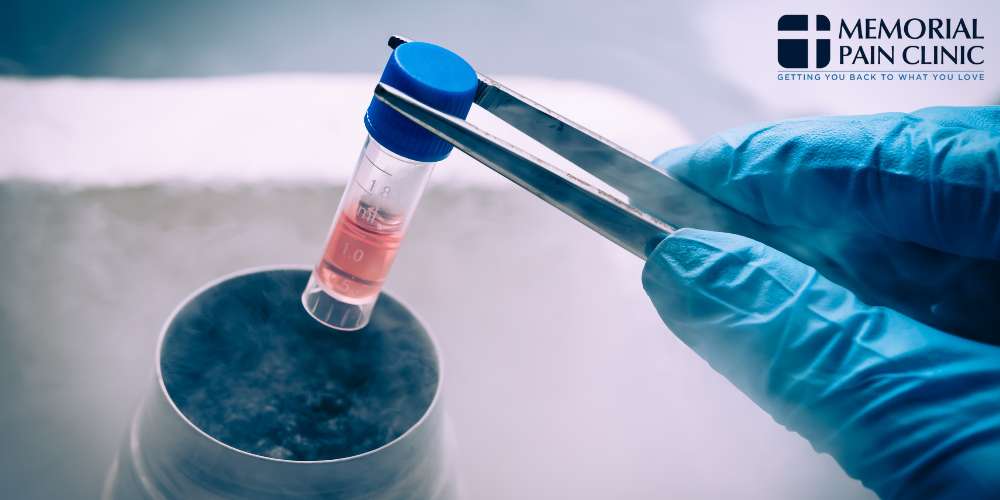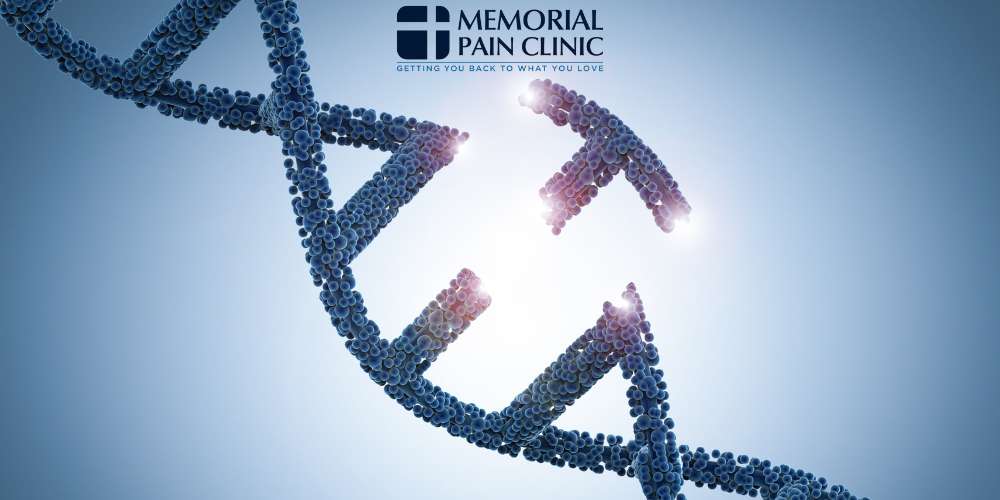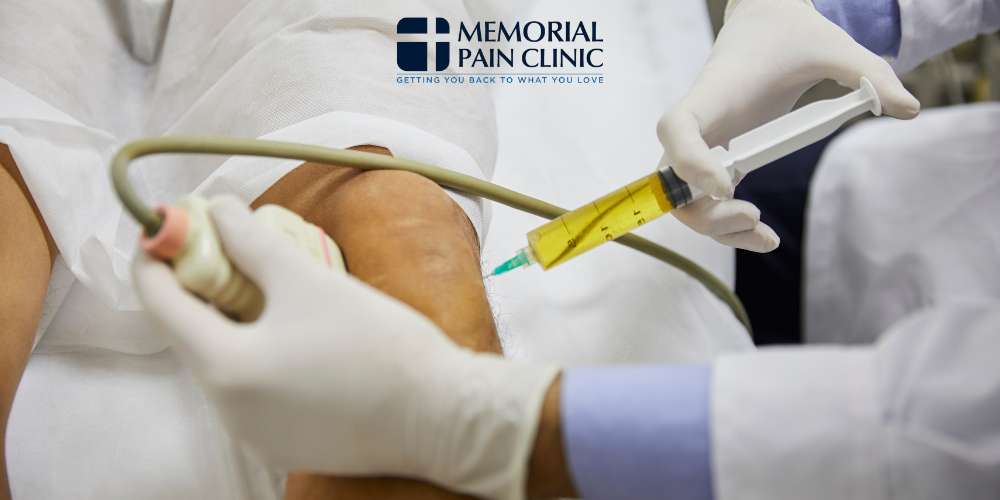Regenerative Medicine Tulsa, OK
Our Services

Discover cutting-edge regenerative medicine in Tulsa, OK, at Memorial Pain Clinic where we specialize in advanced treatments for pain relief and healing. Through innovative therapies harnessing the body’s natural healing mechanisms, we offer solutions for chronic pain conditions that traditional methods may not fully address.
Our regenerative medicine approaches, including cellular therapy and tissue regeneration techniques, are designed to promote long-term recovery by targeting the root causes of pain and supporting tissue repair. Explore how our personalized treatment plans can help restore your quality of life and alleviate pain effectively.
Schedule an appointment with us today by calling 918-200-9944 or by submitting an online intake form.
What Is Regenerative Medicine?
Regenerative medicine is a branch of medical science focused on harnessing the body’s natural ability to repair, replace, or regenerate damaged tissues and organs to restore normal function. It encompasses a wide range of innovative therapies and techniques aimed at promoting tissue regeneration, enhancing healing processes, and treating various medical conditions.
Types of Regenerative Medicine

Key types of regenerative medicine include:
- Stem cell therapy
- Tissue engineering
- Platelet-rich plasma (PRP) therapy
- Gene therapy
- Biomaterials and scaffold-based therapies
- Donor organs and medical devices
- Exosome therapy
Stem Cell Therapy
Stem cells are undifferentiated cells that have the potential to develop into different types of cells in the body. Stem cell therapy involves the use of human stem cells, either from the patient’s own body (autologous) or from other sources, such as donor organs, to promote tissue repair and regeneration. It can promote regeneration for conditions such as spinal cord injury, heart disease, or degenerative joint disease.
Adult Stem Cells
In stem cell biology, adult stem cells are derived primarily from bone marrow. They hold significant promise in pain relief treatments. These cells have the unique ability to differentiate into various types of tissues, offering potential regenerative effects in damaged areas. When used in pain management, adult stem cells can be deployed to target specific sites of injury or inflammation, promoting tissue repair and modulating the immune response.
This approach not only addresses the underlying causes of pain but also supports natural healing processes, potentially offering long-term relief and improved quality of life for patients.
Human Embryonic Stem Cells
Human embryonic stem cells, known for their pluripotent nature, have shown promise in pain relief treatments by virtue of their ability to differentiate into various cell types, including hematopoietic stem cells that give rise to blood cells. These pluripotent stem cells can potentially be directed to generate specific types of neurons or glial cells involved in pain perception and management.
By harnessing their regenerative potential, embryonic stem cells offer a novel approach to alleviating chronic pain conditions, aiming not only to address symptoms but also to repair underlying tissue damage and restore function, thereby enhancing overall patient well-being.
Tissue Engineering
Tissue engineering involves the creation of artificial tissues or organs in the laboratory using a combination of cells, biomaterials, and growth factors. These engineered tissues can be used to replace or repair damaged tissues and organs in conditions such as skin injuries, cartilage defects, or organ failure.
Platelet-Rich Plasma (PRP) Therapy
PRP therapy involves the use of concentrated platelets from the patient’s own blood to stimulate tissue repair and regeneration. PRP is commonly used in orthopedic medicine to treat conditions such as osteoarthritis, tendonitis, or ligament injuries.
Gene Therapy
Gene therapy involves the introduction of genetic material into cells to correct or replace defective genes responsible for disease. Gene therapy holds promise for treating genetic disorders, cancer, and other chronic conditions by targeting the underlying cause at the genetic level.
Biomaterials and Scaffold-Based Therapies
Biomaterials and scaffolds are used to provide structural support and guidance for tissue regeneration. These materials can mimic the properties of native tissues and promote cell growth and tissue formation in applications such as bone grafts, wound healing, or tissue reconstruction.
Exosome Therapy
Exosomes are small vesicles released by cells that contain various growth factors, proteins, and genetic material involved in cell-to-cell communication and tissue repair. Exosome therapy involves the use of exosomes to promote tissue regeneration and modulate the immune response in conditions such as wound healing, neurodegenerative diseases, or cardiovascular disorders.
How Does Regenerative Medicine Work?

Regenerative medicine harnesses the body’s natural healing abilities and combines them with advanced biomedical technologies to promote tissue and organ regeneration. It involves using stem cells, growth factors, and biomaterials to repair damaged tissues or organs. Stem cells, such as those derived from bone marrow or embryonic sources, are particularly crucial as they can differentiate into various cell types needed for specific tissues. These cells are often guided to the site of injury or disease, where they integrate and facilitate repair processes.
Additionally, regenerative medicine explores the development of artificial organs or tissues through bioengineering techniques, aiming to replace or support failing organs with functional substitutes tailored to individual patient needs. This interdisciplinary field holds promise for treating a range of conditions, from traumatic injuries to degenerative diseases, potentially revolutionizing healthcare by enhancing recovery and quality of life.
How Does Stem Cell Research and Therapy Help Relieve Pain?
Stem cell research and therapy contribute to pain relief by leveraging the regenerative properties of stem cells and their ability to produce biologically active molecules. Stem cell therapies involve injecting or implanting these cells into damaged tissues or areas of inflammation, where they can promote tissue repair and modulate immune responses.
Stem cells release factors that reduce inflammation and stimulate local cell growth, aiding in the restoration of damaged structures and alleviating pain. This approach not only targets the root causes of pain but also supports natural healing processes, offering potential long-term benefits for patients suffering from chronic pain conditions.
What Is Regenerative Medicine Used to Treat?
Regenerative medicine is used to treat a wide range of medical conditions across different fields of medicine. Some of the conditions that regenerative medicine techniques can be used to treat include:
- Orthopedic conditions, such as osteoarthritis, tendon injuries, ligament injuries, and cartilage defects
- Neurological disorders, such as spinal cord injuries, strokes, traumatic brain injuries, Parkinson’s disease, Alzheimer’s disease, and multiple sclerosis
- Cardiovascular diseases, such as heart failure, myocardial infarctions (heart attacks), and peripheral artery disease
- Dermatological conditions, such as chronic wounds and ulcers
- Autoimmune disorders, such as rheumatoid arthritis, lupus, and Crohn’s disease
- Cancer
- Organ failure
Arthritis
Stem cell therapy for arthritis pain involves using cellular therapies to harness the regenerative potential of stem cells. By injecting stem cells into arthritic joints, these therapies aim to repair damaged cartilage and reduce inflammation. Stem cells release bioactive molecules that promote tissue healing and modulate the immune system, potentially slowing down the progression of arthritis and alleviating pain.
Neuropathic Pain
Stem cell therapy for neuropathic pain involves utilizing stem cells to target diseased tissue within the nervous system. These stem cells can release neuroprotective and anti-inflammatory molecules, promoting repair of damaged nerves and reducing pain signals.
Degenerative Disc Disease
Stem cell therapy for degenerative disc disease aims to address pain by targeting damaged tissue within the spinal discs. Stem cells can stimulate the regeneration of disc cells and promote the production of extracellular matrix components, which are essential for disc structure and function.
Tissue Damage and Inflammation
Stem cell therapy can help tissue damage and inflammation in the human body by utilizing the body’s own regenerative potential. Stem cells possess the ability to differentiate into various types of cells needed for tissue repair and release bioactive molecules that promote healing and reduce inflammation. When injected into damaged tissues, stem cells can accelerate the natural healing process, potentially restoring function and reducing pain associated with inflammation.
Am I a Good Candidate for Regenerative Medicine?

Good candidates for regenerative medicine techniques are individuals who have certain medical conditions or injuries that may benefit from tissue repair, regeneration, or replacement. While regenerative medicine holds promise for a wide range of conditions, not all patients may be suitable candidates. Some factors that may indicate suitability for regenerative medicine treatments include:
- Chronic pain
- Tissue damage or degeneration
- Exhausted conventional treatment options
- Desire to avoid surgery
It’s essential for individuals considering regenerative medicine therapies to discuss their options with a healthcare professional who can provide personalized guidance, evaluate potential risks and benefits, and develop a treatment plan tailored to their specific needs and circumstances.
Explore Regenerative Medicine for Pain Relief at Memorial Pain Clinic
At Memorial Pain Clinic in Tulsa, OK, we are committed to advancing your journey towards pain relief and improved quality of life through regenerative medicine. Our experienced team combines expertise with compassionate care to tailor treatment plans that address your specific needs and goals. Whether you’re seeking relief from joint pain, arthritis, or other chronic conditions, our innovative regenerative therapies offer promising alternatives to conventional treatments.
Take the next step towards a pain-free life by scheduling a consultation with us today. Discover how regenerative medicine can help you regain mobility, reduce discomfort, and enhance your overall well-being.

